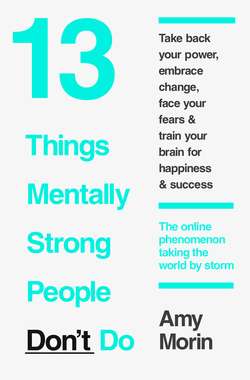Читать книгу 13 Things Mentally Strong People Don’t Do - Amy Morin, Amy Morin - Страница 28
Taking back Your Power will make You Stronger
ОглавлениеYou don’t get to be named one of the most powerful people in the world by giving away your power. Just ask Oprah Winfrey. She grew up in extreme poverty and was sexually abused by several people throughout her childhood. She bounced between living with her mother, father, and grandmother, and as a teenager, she frequently ran away from home. She became pregnant at age fourteen, but the infant died shortly after birth.
During her high school years, she began working at a local radio station. She worked her way through several media jobs, and eventually, she landed a job as a TV news anchor. But she was later fired from the position.
She didn’t allow one person’s opinion of her on-air suitability to stop her, however. She went on to create her own talk show and by the age of thirty-two, her show became a national hit. By the age of forty-one, she had a reported net worth of over $340 million. Oprah has started her own magazine, radio show, and TV network and has coauthored five books. She’s even won an Academy Award. She’s started a multitude of charities to help people in need, including a leadership academy for girls in South Africa.
Oprah didn’t let her childhood or her former employer take away her power. A woman who was once teased because she was so poor she wore potato sacks as dresses was named one of the world’s most powerful women by both CNN and Time. Statistically, her upbringing would have predicted a poor prognosis. But Oprah refused to be a statistic. She chose to define who she was going to be in life by not giving away her power.
When you decide that no one else has the power to control how you feel, you’ll experience empowerment. Here are some other ways how retaining your power will help you become mentally strong:
• You’ll develop a better sense of who you are when you’re able to make choices based on what’s best for you instead of what will prevent the most repercussions.
• When you take responsibility for your own behavior, you’ll become accountable for your progress toward your goals.
• You will never be pressured into doing something that you don’t want to do based on guilt trips or what you think other people want you to do.
• You’ll be able to devote your time and energy to things you choose. You won’t have to blame other people for wasting your time or ruining your day.
• Retaining your personal power reduces your risk of depression, anxiety, and other mental health issues. Many mental health problems are linked to a sense of hopelessness and helplessness. When you decide not to give other people and external circumstances the power to control how you feel and behave, you gain more power over your mental health.
When you hold a grudge, those feelings of anger and resentment do nothing to lessen the other person’s life. Instead, harboring anger and resentment gives that person more power to interfere with your quality of life. Choosing to forgive allows you to take back your power, not just over your psychological health, but also over your physical health. Research shows some of the health benefits of forgiveness include the following:
• Forgiveness reduces your stress. Over the years, many studies have shown that holding a grudge keeps your body in a state of stress. When you practice forgiveness, your blood pressure and heart rate decrease.
• Choosing to forgive increases your tolerance to pain. In a 2005 study of patients with chronic low back pain, anger increased psychological distress and decreased a person’s tolerance to pain. A willingness to forgive was associated with increased pain tolerance.
• Unconditional forgiveness can help you to live longer. A 2012 study published in the Journal of Behavioral Medicine discovered that when people were only willing to forgive others under certain conditions—like the other person apologized or promised to never repeat the same behavior—their risk of dying early actually increased. You don’t have any control over whether someone will apologize. Waiting to forgive people until they say they’re sorry gives them control over not just your life, but perhaps even your death.
